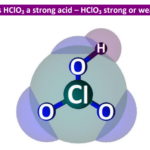Is Hydrochloric (HCl) an acid or base? - Strong vs Weak
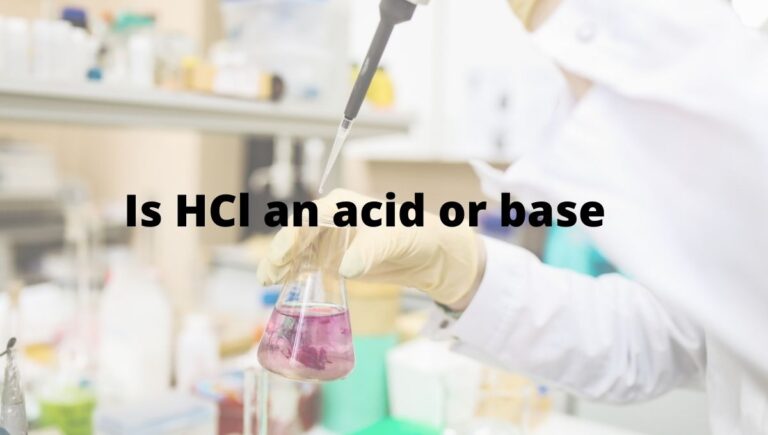
Hydrogen chloride is one of the important elements in chemistry that have an HCl chemical formula. At room temperature, it behaves like a gas. It is soluble in water, methanol, ethanol, or ether.
In this article, we will discuss Is HCl an acid or base? Is it strong or weak? Its conjugate pairs, etc.
So, Is HCl an acid or base? HCl is an acid. Because on dissolving in an aqueous solution it dissociates into two ions (H+ and Cl–), and anything that releases an H+ ion in a solution is considered acid in nature. When hydrogen chloride contact with an aqueous solution or water, it forms hydrochloric acid.
| Name of Molecule | Hydrochloric acid |
| Chemical formula | HCl |
| Acid or Base? | Strong acid |
| Conjugate base | Cl– |
| pH value | < 3 |
| Acidity (pKa) | -5.9 |
Why HCl is acid?
An acid is something we know that donates the H+ ion or proton on dissolving in a solution. In the case of HCl, it completely dissociates in water and gives two ions, H+ and Cl–. So, it has proton donating capability and a low pH value. Therefore, we can say, HCl is an acid.
∴ HCl(aq) → H+(aq) + Cl–(aq)
Generally, we have three theories to check whether HCl is an acid or base?
1. Arrhenius’s theory for acid:
According to this, an acid is something that increases the concentration of H+ ions in an aqueous solution.
As HCl on dissolving in an aqueous solution, it dissociates into H+ and Cl–. So, we can say according to this theory, HCl is an Arrhenius acid.
2. Bronsted-Lowry theory for acid:
As per this, a compound is said to be acid when it donates the proton to other species and forms the conjugate base.
To understand this theory, we have to take the example of HCl reacting with H2O.

As you see in the figure, HCl donates the proton to H2O, and H2O forms H3O+ by accepting the proton from HCl. Thus, HCl forms the conjugate base(Cl-) by losing one proton from it.
Therefore, we can say, in the above reaction, HCl act as a Bronsted-Lowry acid since it donates the proton, and H2O acts as a Bronsted-Lowry base since it accepts the proton.
3. Lewis’s theory for acid:
According to this theory, a compound is an acid when it accepts the pair of electrons from other compounds. HCl acts as lewis acid because the H+ ion in this molecule is a lone pair acceptor.
So, all these theories are enough to know Why HCl is acid in nature?
Is Hydrochloric (HCl) a strong acid or weak acid?
To know whether Hydrogen chloride(HCl) is a strong acid or weak, we have to know the basic difference between a strong acid and weak acid.
Strong acid: Generally, a compound is referred to strong acid when it completely dissociates in solution or they are 100 % ionized in solution. It means all the moles of acid will completely dissociate to yield H+ ions and no undissociated acid remains in the solution.
Examples of strong acids- Sulfuric acid(H2SO4), Nitric acid(HNO3), Hydrobromic acid(HBr), HI, HClO4, etc.
Also, Read:-
- Is H2SO4 a strong acid?
- Is HNO3 a strong acid?
- Is HBr a strong acid?
- Is HI a strong acid?
- Is HClO4 a strong acid?
Weak acid: Generally, a compound is referred to weak acid when they undergo partial dissociation, which means not all moles of weak acid dissociate in a solution to yield H+ ion, and at equilibrium, both undissociated acids and their ionized product present in the solution.
Examples of weak acids- Hydrocyanic acid(HCN), Acetic acid(CH3COOH), Ammonium ion (NH4+), Phosphoric acid(H3PO4), HNO2, HF, HCOOH, H2CO3, etc.
Also, Read:-
- Is CH3COOH a weak acid?
- Is HF a weak acid?
- Is HCN a weak acid?
- Is HNO2 a weak acid?
- Is HCOOH a weak acid?
- Is H3PO4 a weak acid?
- Is H2CO3 a weak acid?
- Is NH4+ a weak acid?
| Strong acid | Weak acid |
| They ionize completely. | They do not completely ionize. |
| They have high conductivity. | They have less conductivity. |
| The value of pH lies between 0 to 3. | The value of pH lies between 3 to 7. |
| They dissociate completely to produce an H+ ion. | They dissociate partially to produce an H+ ion. |
| They are strong electrolytes. | They are weak electrolytes compared to strong acids. |
| Example – HCl, HNO3, HBr, etc. | Example – HNO2, HCOOH, CH3COOH, etc. |
Now, Is HCl strong acid or weak acid? HCl is a strong acid. Because when it is dissolved in an aqueous solution, it is ionized 100 % or nearly 100 % and produces H+ ions in high concentrations. The pH value of HCl is less than 3, as the higher the H+ ion in the solution, the lower the pH value.
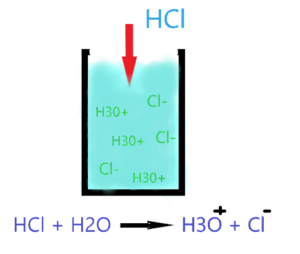
As per the above picture, when HCl dissolves in an aqueous solution, it completely ionizes or dissociates into H+ and Cl– ions. No undissociated parts of it remain in the solution, all parts completely break off and are ionized in an aqueous solution. the presence of high proton ions in the solution shows the strong ability of HCl acid.
H3O+ and H+ are the same things.
The single arrow used in the above reaction shows that only a forward reaction will take place. As Cl– is the very weak conjugate base of HCl, so, it has no power to reform with H+ splitting ion in an aqueous solution and produce an HCl molecule again.
Hence, only splitting ions(H+ and Cl–) of HCl will be available in the aqueous solution that correspondingly shows its strong acid nature.
Also, the acid dissociation constant value(Ka) for HCl is1.3 × 106.
The acid dissociation constant (Ka) is a quantitative measure of the strength of an acid in solution
⇒ If the value of the dissociation constant of acid is greater than 1 (Ka >> 1), then the nature of the compound is a strong acid.
⇒ If Ka < 1, then the nature of the compound is a weak acid.
More reasons, Why HCl is a strong acid?
As we know, halogen atoms are larger in size than hydrogen due to high electronegativity and high energy levels. Hence, the attraction between chlorine and hydrogen atoms becomes weak.
Also, the gap between the orbital of hydrogen(1s) and chlorine(3p) is very large, so, the bond strength of the H-Cl also becomes very weak.
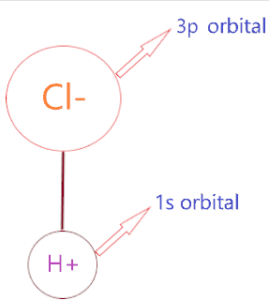
Therefore, the hydrogen easily breaks off from HCl due to its small size and causes HCl to readily dissociates in an aqueous solution and splits into two ions (H+ and Cl–).
One more reason Why HCl is a strong acid? is that chlorine is more electronegative, hence, attracting more electrons towards itself, this induces a negative charge on chlorine and a positive charge on hydrogen.
The differences of charges create a dipole moment in the H-Cl molecule, hence, makes it a polar molecule.
Note:- Polar molecules dissociate more easily in water as electrons are shared less equally due to the large gap of electronegativity of atoms, hence, protons easily leave the molecule as the minimum energy supply needed to break the bond.
List of some common strong and weak acids-

Also Read:
Why is HCl not a base?
A base is something that accepts a proton or donates pairs of electrons. When the base compound is dissolved in an aqueous solution, it liberates OH– ions. More the OH– ions in solution, high is the basicity of the compound.
But HCl does not have any property of base like it does not accept the protons from other species nor it donate the pairs of electrons to other species.
Also, when HCl is dissolved in an aqueous solution, it dissociates and liberates the H+ ion which shows it is acid in nature.
⇒ HCl + (aq) → H+ (aq) + Cl– (aq)
To check whether HCl base or not, use two important theories (Arrhenius theory and Bronsted-Lowry theory).
⇒ Arrhenius’s theory for base:
As per Arrhenius’s theory, a compound is a base when it dissociates in an aqueous solution to yield an OH- ion. So, here HCl only liberates the H+ ion in an aqueous solution. So, HCl is not an Arrhenius base.
⇒ Bronsted-Lowry theory for base:
As per Bronsted-Lowry theory, a compound is a base when it accepts the proton from another compound and forms the conjugate acid.
Consider the reaction of HCl with H2O.
⇒ HCl + H2O → H3O+ + Cl–
So, when HCl reacts with water, it donates one proton to H2O and forms Cl– conjugate base. Hence, HCl is not a Bronsted-Lowry base.
Why HCl act as a Lewis acid?
Lewis’s theory is a very important theory to check whether a compound (HCl) is acid or base?
In short, HCl acts as Lewis acid. Because it has an H+ ion that can accept the electron pairs from a compound donor.
As per Lewis’s theory of acid, a compound that accepts the electron pair from another compound is classified as Lewis acid.
⇒ Lewis acid → electron pair acceptor
⇒ Lewis base → electron pair donator
Lewis acid: They are electron-loving compounds and are also known as electrophilic compounds that accept the electron pair from Lewis bases.
Some examples of Lewis acids that can accept the pair of electrons from another species.
- The molecules or ions with an incomplete octet of electrons. Example – BF3, BCl3, AlF3, etc.
- The molecule that central atom has an empty d-orbital. Example- SiCl4 (1s22s22p63s23p2 3d0).
- The compounds that the central atom formed multiple bonds with the adjacent atoms. Example – SiO2 (O = Si = O), CO2, SO2, etc.
- Simple cations like H+, Na+, Mg+2, Al+3, etc. are lewis acids since they are able to accept the electrons. ( Exception NH4+, PH4+ are not a lewis acid)
Lewis base: They are electron-rich species and also known as nucleophile compounds that donate the electron pairs to the Lewis acids.
Some examples of Lewis bases that can donate the pair of electrons to other species.
- The negative ion such as H–, OH–, F–, etc.
- Species that have lone pair of electrons. Example – NH3, H2O, CH3–, etc.
Let’s take an example to understand why HCl act as Lewis acid?
⇒ NH3 + HCl → NH4+ + Cl–
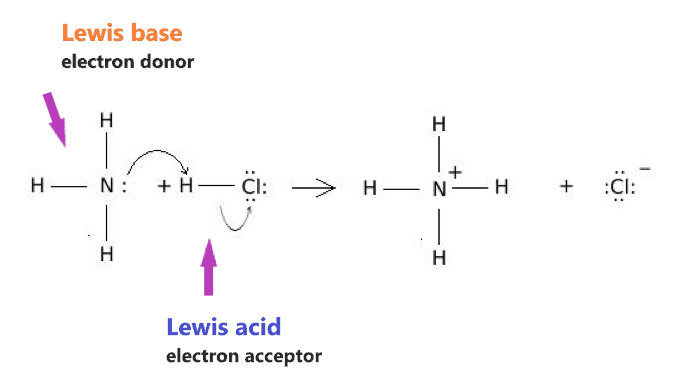
As we know, In the HCl molecule, the chlorine atom is more electronegative than the hydrogen atom, therefore, more electrons will be attracted to the side of the chlorine atom, which will induce a negative charge on the chlorine atom and a slightly positive charge on the hydrogen atom.Now, in the NH3 molecule, the nitrogen atom has lone pair that is attracted towards the slightly positive hydrogen atom in the HCl molecule.As the lone pair on the nitrogen atom approaches the hydrogen atom, the electrons in the HCl bond are repelled still further towards the chlorine atom.And in this process, a coordinate bond is formed between the hydrogen and nitrogen, and the chlorine breaks away as a chloride ion.Therefore, the HCl molecule will act as a Lewis acid as it accepting the pair of electrons from NH3 and, in this process, it breaks up. [Source google: Lewis acid & base]
What is the Conjugate base of HCl
In simple terms, any compound that formed after the removal of a proton from acid is called the conjugate base of that acid. And when H+ is added to the base then the compound is formed which is called conjugate acid of that base.
Remember the following concept of conjugate acid-base pair.
- A very strong acid always forms a weak conjugate base.
- A very strong base always forms a weak conjugate acid.
- A very weak acid always forms a strong conjugate base.
- A very weak base always forms a strong conjugate acid.
So, HCl is a strong acid which forms a weak conjugate base.
The conjugate base of HCl is Cl–.
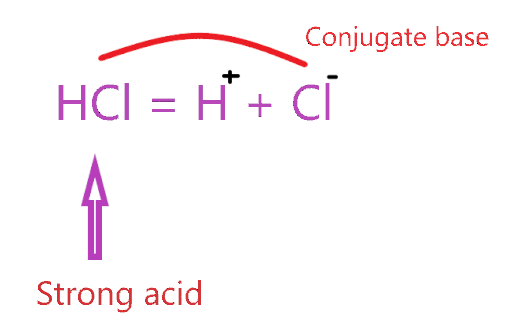
HCl as a strong acid loses one proton and forms Cl– weak conjugate base.
How to check practically if HCl is acid or base?
By using litmus paper, we can check practically whether HCl is an acid or base.
Litmus is a weak organic compound that changes color when contacted with acid or base. Its mainly used for checking the acidity or basicity of material. It is also called pH indicator paper.
It works under two conditions-
(a). When the base is contacted with red litmus paper it turns blue.
(b). When the acid is contacted with blue litmus paper it turns red.
So, When HCl is contacted with blue litmus paper then litmus paper turns into red color. So, we can say HCl is an acid.
Uses of Hydrochloric acid
- It is used in the production of batteries, fireworks, bulbs, etc.
- It is used as an additive in the food industry.
- It is used in many oil extraction processes or in removing limestone from rock.
- It is used to deionize the water.
- HCl plays an important role in wastewater management.
- It is used for purifying salt.
- In the manufacture of PVC.
- It is used for regulating the pH value.
- It is used for removing metal stains.
Properties of Hydrochloric acid
- HCl is a colorless and transparent liquid.
- It has a pungent odor.
- It has a melting point of −114.22 °C and a boiling point of −85.05 °C.
- Due to its polar nature, it is soluble in water.
- It has a linear molecular shape and a 1.05 dipole moment.
- It has a molar mass of 36.46 g/mol.
Production of HCl
(1). HCl can be produced by directly combining hydrogen and chlorine.
⇒ Cl2 + H2 → 2 HCl
(2). HCl can be generated by the reaction of sulfuric acid and sodium chloride.
⇒ NaCl + H2SO4 → NaHSO4 + HCl
(3). By reacting Sodium bisulfate with Sodium chloride.
⇒ NaCl + NaHSO4 → HCl + Na2SO4
(4). By hydrolysis of phosphorous pentachloride.
⇒ PCl5 + H2O → POCl3 + 2 HCl
Conclusion
At last, we are going to take the last overview of this article on whether HCl is an acid or base with some important points. Almost all concepts of HCl acid-base are cleared in this article. Still, if you have any doubt regarding this you can clear it by asking in the comment box!
- Is HCl an acid or base? HCl is an acid. Because it has a proton donating ability. Also, the value of the acid dissociation constant of HCl is very high, close to 1.3 × 106.
- Hydrochloric acid (HCl) acts as Lewis acid. Because it has an H+ ion that can accept the electron pairs from a compound donor.
- HCl is a strong acid. Because it is ionized 100 % in an aqueous solution and produces an H+ ion in a high concentration.
- The conjugate base of HCl is Cl–.
About the author
Vishal Goyal is the founder of Topblogtenz, a comprehensive resource for students seeking guidance and support in their chemistry studies. He holds a degree in B.Tech (Chemical Engineering) and has four years of experience as a chemistry tutor. The team at Topblogtenz includes experts like experienced researchers, professors, and educators, with the goal of making complex subjects like chemistry accessible and understandable for all. A passion for sharing knowledge and a love for chemistry and science drives the team behind the website. Let's connect through LinkedIn: https://www.linkedin.com/in/vishal-goyal-2926a122b/

